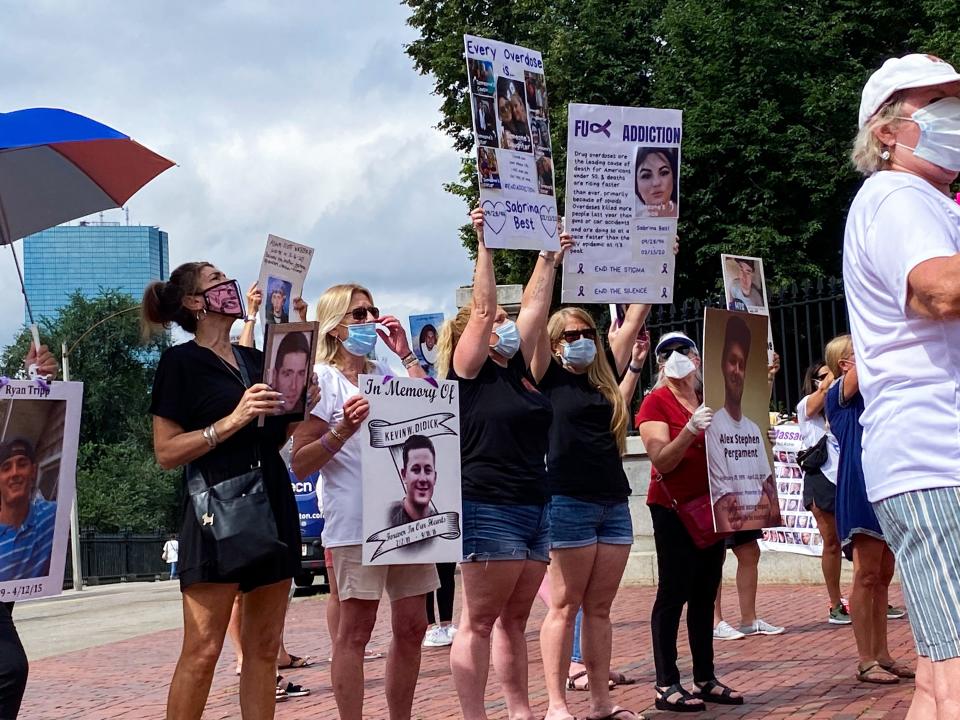Here's what Taunton, Raynham will get from $26B national opioid settlement
- Oops!Something went wrong.Please try again later.
TAUNTON — Taunton and Raynham have opted in to their share of a $26 billion national settlement with three opioid distributors and one manufacturer.
The settlement, which was reached in July, holds three drug distributors — Cardinal Health, McKesson and AmerisourceBergen — and pharmaceutical giant Johnson & Johnson, accountable for their roles in the U.S. opioid epidemic.
Taunton's share would be $1.06 million, though the money would be spread over 18 years. Ligia Madeira in the office of Mayor Shaunna O'Connell confirmed Wednesday that the city has agreed to join the settlement. The money is earmarked for drug prevention and treatment. Raynham's portion would be $59,607.

Madeira noted that the settlement remains to be approved by the court and is contingent on enough municipalities joining in order to finalize the agreement.
Cities and towns have until Feb. 25 to sign on. That deadline was recently extended from Jan. 26, citing COVID.
Massachusetts is set to receive up to $537 million from the settlement, according to Massachusetts Attorney General Maura Healey. States collectively decided how much money each would get based on a formula that considered the impact of the opioid epidemic in that specific state — using factors like overdose deaths, number of residents with substance abuse disorder, number of opioids prescribed and population, according to a release from Healey's office.

In Massachusetts, the state will allocate all but 15% of the settlement. The remaining 15% will be divided up among Bay State municipalities. Taunton would get 1.3% of the portion set aside for cities and towns.
Attorneys general from California, Colorado, Connecticut, Delaware, Florida, Georgia, Louisiana, Massachusetts, North Carolina, New York, Ohio, Pennsylvania, Tennessee and Texas were involved in the litigation, according to a release from Healey's office.
Impact on overdoses: Taunton's 2020 crime stats reveal COVID's impact
“I promised the people of Massachusetts that the opioid crisis would be a top priority, that we would hold the bad actors accountable, and that the billion-dollar companies who got rich off the suffering in our communities would pay,” Healey said when the settlement was announced.
“(The) announcement is another step forward in that work. This money will benefit every city and town in every part of our state. My team worked hard to make this happen, and we will continue to pursue justice for the people who were hurt and secure resources for prevention, treatment, and recovery.”
According to the release, the three drug distributors will pay up to $21 billion over 18 years. Johnson & Johnson will pay up to $5 billion over nine years.
Funds that do not go to municipalities will go to the statewide Opioid Recovery and Remediation Fund for opioid prevention, harm reduction, treatment and recovery programs statewide.
Besides having to pay billions of dollars over the next several years, the drug companies also must agree to provide for 10 years certain information about their practices. The drug distributors are ordered to create a centralized independent clearinghouse to provide the distributors and state regulators with data and analytics about the movements of drugs.
They are also being ordered to use various methods to combat suspicious opioid orders and misuse and illegal distribution of drugs.
Johnson & Johnson has been ordered to stop selling opioids, for example.
Those industry changes are intended to prevent an opioid crisis from ever happening again, according to the release.
Here are approximate settlement amounts earmarked for the Gazette readership area based on data from the attorney general's office:
Taunton $1,060,038
Dighton $18,527
Raynham $59,607
Berkley $97,466
Raynham has already voted to accept the settlement. At press time, the Gazette was checking with Dighton and Berkley about their plans.
Wheeler Cowperthwaite of the Quincy Patriot Ledger contributed to this report. Send your news tips to reporter Chris Helms by email at CHelms@tauntongazette.com. Support local journalism by purchasing a digital or print subscription to The Taunton Daily Gazette.
This article originally appeared on The Taunton Daily Gazette: Taunton, Raynham join Attorney General's opioid settlement

